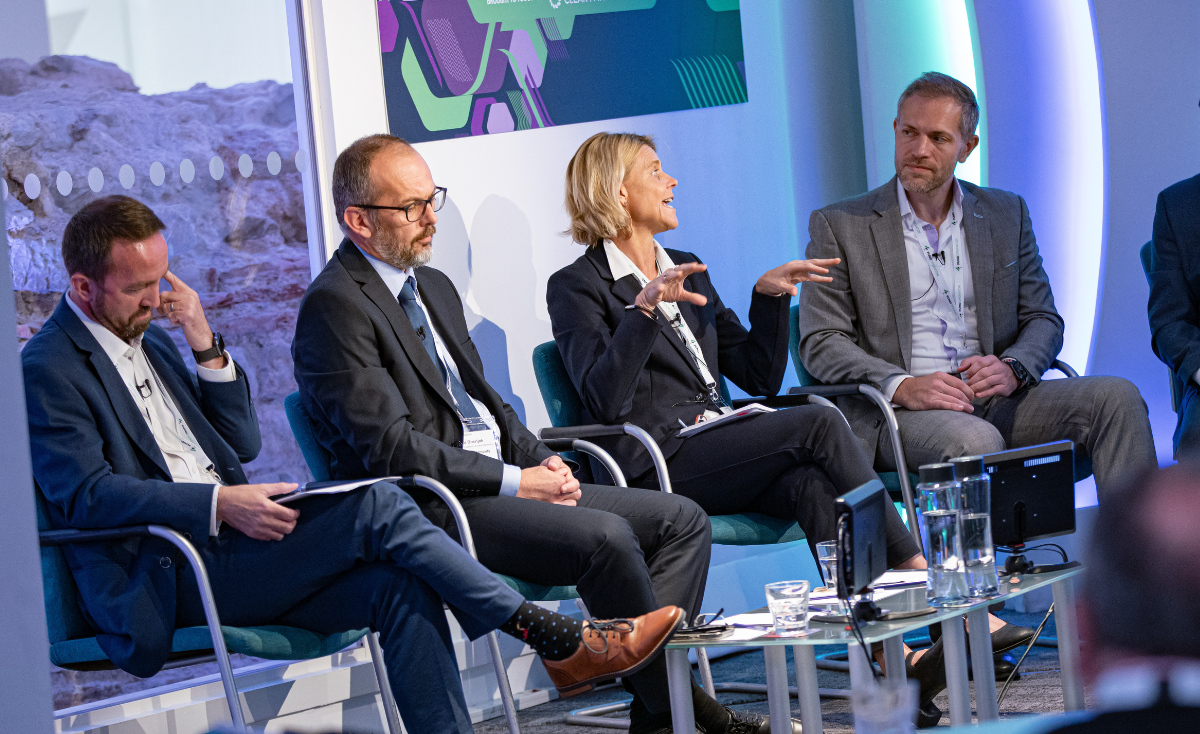 (L-R) Harris, Bosnjak, Burnett, and Germano give their thoughts on fee compression.
(L-R) Harris, Bosnjak, Burnett, and Germano give their thoughts on fee compression.
Fundamental structural change is on the horizon for the operations side of the investment industry. Four senior operations panellists expressed this sentiment in a lively panel discussion on “The future of investment operations and the case for new models in a fee-compressed world” — which took place at the Fund Operator Summit | Europe 2023 event in London on Tuesday.
The panel — featuring Tim Harris, Head Of Operations London, LGPS CIV; Meagen Burnett, Group Chief Operating Officer, Schroders; Igor Bosnjak, Global Head of Investment and Data Operations, Russell Investments; and Michael Germano, Global Chief Operating Officer, Newton Investment Management — said this issue was key to the industry’s relevance and longevity.
“It feels like as an industry we’re running against a brick wall,” said Bosnjak. “We keep cutting and changing operating costs, but we really need to close the gap between the front and back office.” There was a fear of change, he said — and in order to counter it, resources should be reconfigured to increase effective and judicious operating presence.
Burnett was unequivocal in her belief that the industry needed to move on and find a way to balance these differing needs. She said she felt the future wasn’t just about cost cutting — even though “the biggest drive is pressure on fees”. Instead, she said, the focus needed to be on “structural change”, not just sticking with the same cyclical pattern that asset managers are historically used to. Ultimately, one big goal, she added, was squeezing more efficiency out of the models that were designed in a different era and economy.
“We need to manage [client] demand more efficiently and come up
with a more simplified operating model.”
“None of us can shrink ourselves to greatness,” she said, speaking of the cost-cutting and other attempted methods of driving profit in a tight economy. “We need to manage demand more efficiently with our clients and come up with a more simplified operating model.”
For Harris, it was mainly a time issue — trying to do more with the resources available, which includes human capital. “Value proposition and value options are most important to us when we’re working with our clients,” he said.
This, he continued, meant looking at an organisation’s culture to see where to drive efficiencies. “You need to look at your outsourcing model. You need to pick the right partners that make sense for the business in the short and long term,” Harris said.
Outsourcing – the only option?
The conversation turned to the outsourcing — a major, if not the biggest, focus, said all the panellists — of current strategies to manage fee compression. “Outsourcing is the theme of the day,” said Germano.
“Outsourcing is the theme of the day.”
His advice on the topic was to find the right vendor at the right scale. “They should bring something to the table you can’t do yourself — for example, a scalable model you couldn’t build,” he said. “It’s been talked about for years, but it’s hard to accomplish. We need to rethink legacy platforms and reduce duplication. We’re looking for providers who are doing the work to invest in [their own] growth and differentiating elements.”
Harris and Bosnjak echoed these sentiments. Harris said his key advice was to work with vendors big and small – big for trust and reliability and small for innovation and manoeuvrability.
The future is tech
A critical offshoot of the outsourcing discussion was one of future technology — and as is typical, Artificial Intelligence (AI). The conversation turned to the tools that would emerge as winners in the next five to ten years, a key concern for both the panel and the audience.
“Absolutely, tech will change the landscape,” said Burnett. She noted this prediction was one of the investment industry’s “key hopes” when it came to reducing fee and time pressure.
“Often, there is support for a recognised brand just because managers feel safe,
but then it doesn’t go well.”
Data quality and progress were paramount to these ambitions, with Burnett saying that the possession and use of distributed ledgers, in particular, had mass potential for disruption. Most critical to success, however, was “getting the data right”. “That’s the real accelerator in my view,” she added.
Bosnjak said that, in his view, teams needed to take a step back and ensure they were properly digesting the changes — large and structural — that were coming now and down the line. “It’s complicated, and you don’t want to miss an opportunity,” he said, referring to AI capabilities.
His perspective was that operations teams were “stuck in the middle”, which led to sticky situations. Going forward, they needed to be better integrated into the front- and back-office pipeline.
A question from the audience focused on how independent thought in supplier selection was lacking in the industry — and how this issue could be remedied. “Often, there is support for a recognised brand just because managers feel safe, but then it doesn’t go well,” said the audience member. He posed the following questions: “What can services and operational teams add to the investment process?” and, “How can it empower investment decision in 15 years?”
Opportunities in abundance
There is an immense opportunity for operations platforms, said Burnett.
“We can’t just try to do things more efficiently.
We have to change the entire system.”
Germano said the view that “data is an asset” is cliched but true — and now people are starting to catch on. “We need to identify what’s Intellectual Property (IP) and what’s commodity,” said Bosnjak. “Then we will come closer to closing the gap — but it will require multi-skill partners, not those with a siloed approach.”
Burnett concluded that she didn’t see “computers replacing humans”, but the opportunities for firms fell in the API area — ensuring data was accessible across an organisation. “We can’t just try to do things more efficiently,” she said. “We have to change the entire system.”
Please Sign In or Register to leave a Comment.
SUBSCRIBE
Get the recent popular stories straight into your inbox







